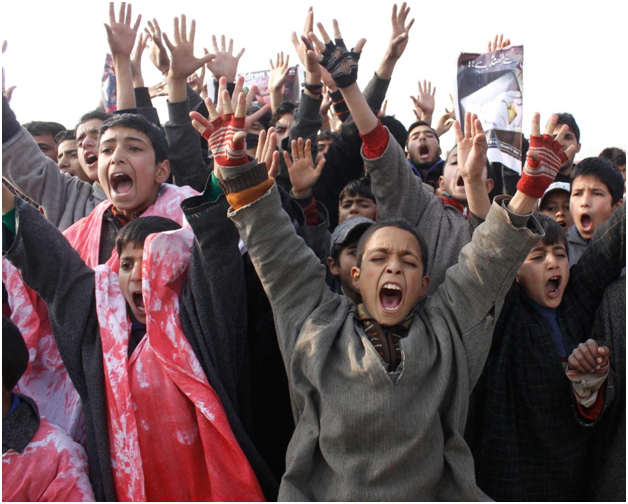Kashmir United in Deploring Peshawar Attack
Protests in Kashmir against Taliban attack on school in Peshawar

SRINAGAR: Irrespective of world response to their problems and issues, the people of restive Jammu & Kashmir have demonstrated enviable consistency in deploring acts of terrorism and violence against civilians in any part of the world—Palestine or Peshawar.
People representing all walks of life and sections of Kashmir’s society have vociferously condemned the brutal terror attack by the Tehreek-i-Taliban Pakistan (TTP) on December 16 in Peshawar, leaving more than 145 persons dead, most of them school children studying in Pakistan Army’s School.
By strongly deploring the attack on Peshawar’s army-run school, the people of Kashmir have once again showcased their love for peace and hatred against violence and acts of terrorism.
This unconditional solidarity with the Pakistani victims of violence is in fact a strong message that Kashmiris are firm in achieving their larger political goals through peaceful means and may not revert to violent expression of dissent.
School children, mothers, fathers, intellectuals, writers and journalists have come out in open to denounce the recent violent attack in Peshawar and demanded justice for the survivors. Several peaceful protests, solidarity vigils, candle-light vigils and prayers in absentia were organized in many parts of the Kashmir Valley, especially in summer capital Srinagar.
Moreover, the social networking sites like Facebook and Twitter are abuzz with strong messages of condemnations of violence and solidarity with victims, especially from Kashmir’s younger generation.
On the political front both factions of the All Parties Hurriyat Conference (APHC)—the two dominant camps of Kashmir’s resistance against Indian rule in Kashmir— have termed the latest attack by the TTP as shameful and barbaric.
Kashmir Valley’s head priest and chairman of a faction of the Hurriyat Conference, Mirwaiz Umar Farooq, while addressing Friday congregation at historic Jama Masjid in Srinagar said that it was incumbent upon Muslim leaders and Islamic scholars to introspect and look for serious answers why certain elements were hell bent upon committing serious and heinous crimes against humanity in the name of religion to vilify it.
“The attack on a school in Peshawar is gruesome and barbaric. It is a matter of serious concern. Muslim leaders and Islamic scholars must introspect and find reasons why some people are perpetrating violence in the name of Islam to defame this religion of peace & prosperity,” Mirwaiz said in his Friday sermon in Central Mosque, Srinagar.
Umar Farooq also applauded the role of seminaries (Madrassas) of the past, saying that many intellectuals and thinkers were produced in Madrassas during Islam’s 1400-year old history. However, he acknowledged that in the present times their (Madrassas) role has unfortunately become limited and suspicious.
“Earlier Madrassas would produce intellectuals, thinkers, scientists, philosophers and eminent personalities but sadly in today’s world some of the Madrassas are seen with suspicion and breeding ground for extremists and terrorists.”
Hugely popular octogenarian resistance leader Syed Ali Shah Geelani also described the attack on school children in Peshawar as “un-Islamic”.
“Such attacks are barbaric and un-Islamic. It is the duty of every conscious Muslim to wage a war against such elements who are actually enemies of Islam and Muslims while making tall claims to spearhead struggle for Islam and Muslims,” Geelani said, adding that the perpetrators of violence must be served stern punishments.
Both Syed Ali Geelani and Mirwaiz Umar Farooq separately led prayers in absentia in Srinagar to mourn the killings of children killed in the attack. Taliban had stormed a military-run school in Khyber Pakhtounkha on Tuesday in one of the deadliest attacks in recent memory.
Jammu & Kashmir’s outgoing Chief Minister Omar Abdullah expressed outrage on Peshawar attack. He wrote on Twitter: “What terrible, heart breaking images of the attack in #Peshawar. Inhuman and barbaric don’t even begin to describe the perpetrators.”
Expressing his opinion on the retaliatory action of Pakistan army by killing the TTP chief Fazlullah, aka ‘Mullah Radio’, senior journalist Shuja’at Bukhari wrote on Facebook: “Why didn’t Pakistan Army kill the TTP chief Fazlullah till now? Was he a good Taliban till the time he ordered attack in Peshawar?”
Some elements in Kashmir are also ridiculing the ‘Good Taliban, Bad Taliban’ debate by arguing that “killing machines like the TTP can only be bad.”
Kashmir has presented a united face in deploring the Peshawar terrorist attack.



